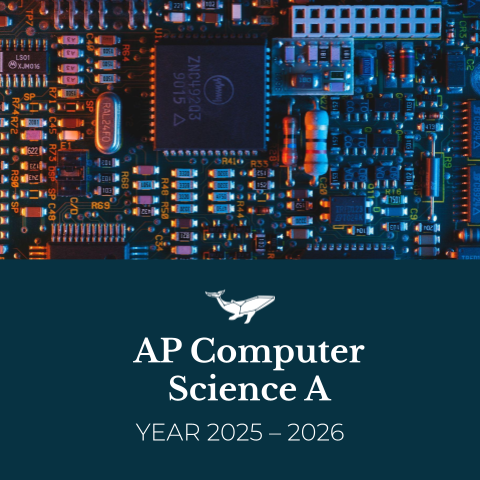AP Computer Science A
Year 2025 – 2026
August start: Monday, August 25, 2025 – Friday, May 15, 2026
September start: Monday, September 8, 2025 – Friday, May 15, 2026
Format
Fixed-Pace Course
Prerequisites
Algebra 2
Credit
AP
Year 2025 – 2026
August start: Monday, August 25, 2025 – Friday, May 15, 2026
September start: Monday, September 8, 2025 – Friday, May 15, 2026
Format
Fixed-Pace Course
Prerequisites
Algebra 2
Credit
AP
Year 2025 – 2026
August start: Monday, August 25, 2025 – Friday, May 15, 2026
September start: Monday, September 8, 2025 – Friday, May 15, 2026
Format
Fixed-Pace Course
Prerequisites
Algebra 2
Credit
AP
-
This course is the equivalent of a college-level introductory Computer Science course. The course uses the Java programming language and emphasizes object-oriented programming. Topics covered include the design of solutions to problems, the use of data structures to organize large sets of data, the development and implementation of algorithms to process data and discover new information, the analysis of potential solutions, and the social implications of computing systems. On successful completion of this course, students will be prepared to sit the AP Computer Science A exam.
-
To successfully complete this course, students will need access to a laptop or desktop computer with a reliable internet connection and a working webcam and microphone.
In addition, this course may require purchase of texts or other course materials.
-
CLI partner schools observe a wide range of calendars, including academic years which begin both before and after Labor Day. To accommodate this, yearlong courses are offered with both “August start” and “September start” options. For more information and to assist us in matching your school’s calendar, please reach out to your CLI contact.
This Fixed-Paced course incorporates a blend of synchronous and asynchronous elements. Students and teacher meet live via zoom on a regular weekly schedule. In addition, students complete coursework including guided readings, interactive videos, text and video-based discussion threads, problem sets, individual and collaborative projects, and so on. While these activities are time-flexible, teachers sequence them with weekly deadlines to help students keep on track and encourage and support the development of productive time management skills.
During the course orientation period, CLI asks students to complete a survey on their availability for live class meetings. Teachers set individual class meeting times based on student responses.


